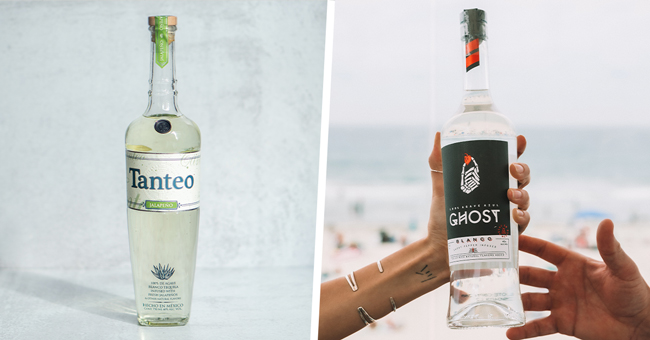Last month, Pernod Ricard acquired peanut butter whiskey Skrewball, a play that came as flavored whiskey develops into a fast-growing segment. But is the same evolution occurring for flavored versions of the spirit industry’s other rising spirit, tequila?
“Flavored tequila isn’t as established as flavored whisky,” said Adam Rogers, research director of the IWSR Drinks Market Analysis. “Not as many leading tequila brands also offer a flavored option compared to flavored whisky.”
Though on a smaller scale compared to flavored whisky, the segment is growing, he added. Many major tequila brands or larger spirit companies have more recently hedged their agave bets on ready-to-drink tequila cocktails over flavored spirits.
Within the tequila category, the flavored segment grew over 20% from 2019 to 2020, with super-premium flavored tequila growing 65% over the same period, according to the IWSR. That may be due to a number of new entrants positioning themselves as more premium than incumbent brands.
Anteel Tequila is one of them, offering a coconut lime and a blood orange blanco. The company was founded in 2018 and recently received an investment from Pronghorn, an initiative focused on boosting Black entrepreneurship in spirits.
“People are flocking to tequila at an unbelievable rate, and we’ll begin to see trends that will somewhat mimic the interest in flavored vodkas that began years ago,” said founder Nayana Ferguson.
Perhaps the most well known recent addition to the category is 21Seeds, a flavored tequila infused with fruit juice that quickly gained national distribution after its launch in 2019. Last year Diageo acquired the female-owned company, citing its ability to tap into the emerging trends of simple at-home cocktails and premium spirits. Independent flavored tequila brands say they are also benefiting from more drinkers making cocktails at home.
Spicy Margs Made at Home
Tanteo Tequila launched in 2009 with a 100% agave jalapeño tequila that appealed to “geeky” cocktail drinkers, in the words of CEO Niel Grosscup.
The brand’s first account was Death & Company, a well-known craft cocktail bar in Manhattan; it has since grown distribution nationally, although major metropolitan markets are still where it sells the best. Tanteo has also released several different chile infusions and a blanco, but the jalapeño – a more familiar pepper in the U.S. – is still its flagship item. Now, the spirit’s appeal has gone beyond professional bartenders.
“Before the pandemic, American consumers were going to their local bartender to have that spicy margarita,” said Grosscup. “Lockdowns changed some things and consumers got more comfortable making a spicy margarita at home.”
The spicy tequila brand depleted about 54,000 liter cases in 2022, growing shipments by 3%.
Tanteo’s competitor, Ghost Tequila, launched in 2016, and has grown in volume by more than 100% each year. It’s now available across the U.S., and in the Caribbean, Europe, and Asia. The brand has grown with strong support from bartenders, according to Alex Carregal, a Boston bartender, and Ghost Tequila’s self-described “master of ceremonies” who has been working for the brand in various sales, marketing, and cocktail development roles since its inception.
“We’ve always had strong support among bartenders, but now with the increased interest in making cocktails at home, not to mention the growing interest in spicy food and drink, we’re seeing great traction in the off-premise channel across the country,” he said.
Flavor Comes with Challenges
Part of flavored tequila’s challenge is distancing itself from flavored spirits’ reputation as artificial, especially in a category that appeals to customers for its lack of additives.
Blanco tequilas with 100% agave labels aren’t permitted to use additives like caramel color and sugar extract seen in some aged tequilas. Those same silver tequilas are also required to be at least 35% ABV, so unlike with flavored whiskeys or vodkas, producers cannot lower the alcohol content and increase other flavors.
“I think the challenge of making a quality product is that high alcohol content is going to intensify the flavor, and if you’re using an artificial flavor, it’s going to taste really intensely artificial,” said Grosscup.
That may be why flavored tequilas aren’t necessarily popular among agave aficionados. At Moreno’s Liquors in Chicago, which houses one of the largest agave selections in the country, the majority of flavored tequilas don’t sell at all, according to owner Mike Moreno.
“We have noticed some increase in coffee flavored tequilas along with those that are marketed well via TikTok such as 21Seeds, but overall the category is slow to grow,” he said.
The white space may represent an opportunity for agave spirit producers to lean on Mexican culinary or distilling traditions to offer customers an authentic spirit that’s also flavored with more than agave. Mezcal and some tequila brands offer pechuga variations, for example, a technique when producers also add a mix of protein, fruits, herbs, nuts, and spices to the still during distillation.
Both Ghost and Tanteo emphasize the quality of the base spirit. Ghost markets itself as a tequila that’s spicy, not flavored, emphasizing that its initial goal was to craft a 100% agave tequila, and then spice it up. Tanteo also focuses on its use of fresh peppers sourced from different regions of Mexico. As for future innovation, Tanteo will be using Mexican flavors and ingredients, such as coffee, as its guiding light, said Grosscup.
“If there’s a product that has a real need to exist and it helps bartenders of all skill levels make better cocktails, we want to participate in that,” he said.
